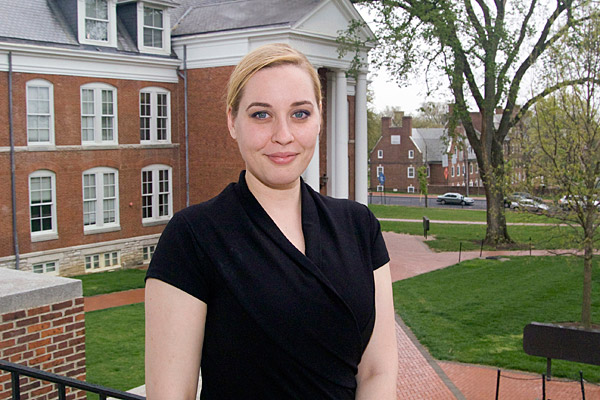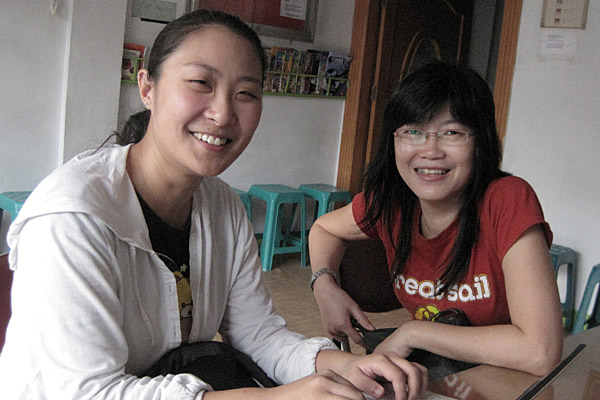Fulbright winners
Two UD students win Fulbright Awards for research in France, Indonesia
1:24 p.m., April 30, 2012--Isabelle Havet and Anne Peng, graduate students at the University of Delaware, have won U.S. Student Fulbright Awards to study abroad during the 2012-13 academic year.
Havet, a doctoral student in the Department of Art History, will conduct research at the Université de Lille in France for her dissertation, which examines how subterranean space was understood, imagined and consumed through various media during the second half of the 19th century in France. Catacombs, sewers, caves, mines, the deep sea and the newly launched metro system all took on rich visual and textual forms in Second Empire and Third Republic France.
Global Stories
Fulbright awards
Peace Corps plans
Havet’s adviser, Nina Kallmyer, professor and chair of the department, who teaches 18th- and 19th-century European and French art history, expressed her delight and pride concerning the selection. “Isabelle is our second Fulbright two years in a row, the other being Corina Weidinger, who is in the midst of her 2011-12 Fulbright year working in Belgium. It's so fulfilling to see one's students get on so brilliantly,” Kallmyer said.
Anne Peng, doctoral student in linguistics and cognitive science, will travel to Indonesia to study Indonesian Teochew, a unique Chinese language that is spoken by groups of ethnic Chinese who have been residing in Indonesia for two to four generations.
The aim of Peng's dissertation research is to document and describe various aspects of this unstudied endangered variety of Chinese spoken in Indonesia and an under-described variety of Malay spoken in Kelantan, Malaysia. Interestingly, these languages are historically unrelated, but the Chinese spoken in Indonesia has acquired some linguistic properties that are not typically seen in Chinese languages but can be found in Indonesian/Malayic languages.
Peng’s adviser, Peter Cole, professor in the Department of Linguistics and Cognitive Science, cites the importance of her work for UD because “she is the latest in a series of students in our department who are conducting research in Indonesia in collaboration with an important German research unit, the Max Planck Institute for Evolutionary Anthropology (MPI EVA).”
MPI EVA has a field station in Indonesia’s capital, Jakarta, where researchers are engaged in various projects. One such project, funded by the National Science Foundation, involves the study of Malayic languages spoken in central Sumatra, some of which no one has ever investigated before.
“These different projects illustrate the growing internationalization of our department and of the UD campus,” Cole says.
Lisa Chieffo, associate director of student programs at the Institute for Global Studies and associate professor of foreign languages and culture, reaffirmed the importance of receiving a Fulbright scholarship.
“There is no question that a Fulbright award has name cache and is an honor that students will continue to list on their CVs long after they have received their degree,” Chieffo said.
Depending on their level of study, some students will use their Fulbright year to gather data for their doctoral dissertation, while others who may have just received their bachelor's degree may use the year to take their first graduate-level courses and find direction for their future studies or careers.
“Ultimately, Fulbright provides the opportunity for cultural exchange all across the globe, and it is very satisfying to see UD students successfully competing for these awards,” Chieffo said.
About the Fulbright Program
The Fulbright Program is an international educational exchange program sponsored by the U.S. government and designed to “increase mutual understanding between the people of the United States and the people of other countries.” It is named for James William Fulbright (1905-95), U.S. Senator from Arkansas from 1945 to 1975. He supported the creation of the United Nations and was the longest serving chairman in the history of the Senate Foreign Relations Committee. He helped establish the Fulbright Program and was a mentor to President Bill Clinton, who is also from Arkansas.
“Fulbrighters,” as they are called, now number 111,000 from the U.S. and 183,000 from other countries, and have participated in the program since its creation some 60 years ago. The Fulbright Program awards approximately 7,500 new grants annually and operates in 155 countries. The program chooses participants for their academic merit and leadership potential.
U.S. citizens may receive funding to go to a foreign country and non-U.S. citizens may come to the U.S. either as students, visiting scholars, and or under a teacher exchange program. For more information on Fulbright Scholarships and how you can apply visit this website.
Article by Fariba Amini












